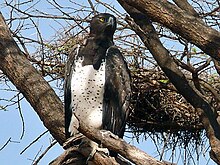NEWS / 9 OCTOBER
2017, 10:04PM / STAFF WRITER
 The population of Africa’s
largest eagle species is in freefall in South Africa and may be edging towards
extinction, according to a new UCT study.
The population of Africa’s
largest eagle species is in freefall in South Africa and may be edging towards
extinction, according to a new UCT study.
Martial eagle sightings have
dropped by as much as 60% since the late 1980s, in stark contrast to human population
growth across their shared natural habitat, the study published this week in
the scientific journal Bird Conservation International found.
Although the exact reasons for
the decline remains unclear, researchers say their findings point to an urgent need
to better understand the threats to the bird.
The study also highlighted a
decline in Martial eagle sightings within protected areas, including the Kruger
National Park and the Kalahari Gemsbok National Park.
However, declining numbers of the
species in protected areas were not as severe as elsewhere, suggesting that
these areas could act to limit the factors leading to the sharp decline.
Dr Arjun Amar and PhD student
Danië* Cloete from UCT’s FitzPatrick Institute of African Ornithology conducted
the study using two Southern African Bird Atlas Project surveys carried out 20
years apart.
Their previous research showed
that comparing these surveys provided an accurate way of measuring changes in
the population size of this species.
Martial eagle total population
figures are still relatively inexact, but their conservation status was
uplisted in 2013 from Near Threatened to Vulnerable - which means they are
recognised to be globally threatened.
No comments:
Post a Comment